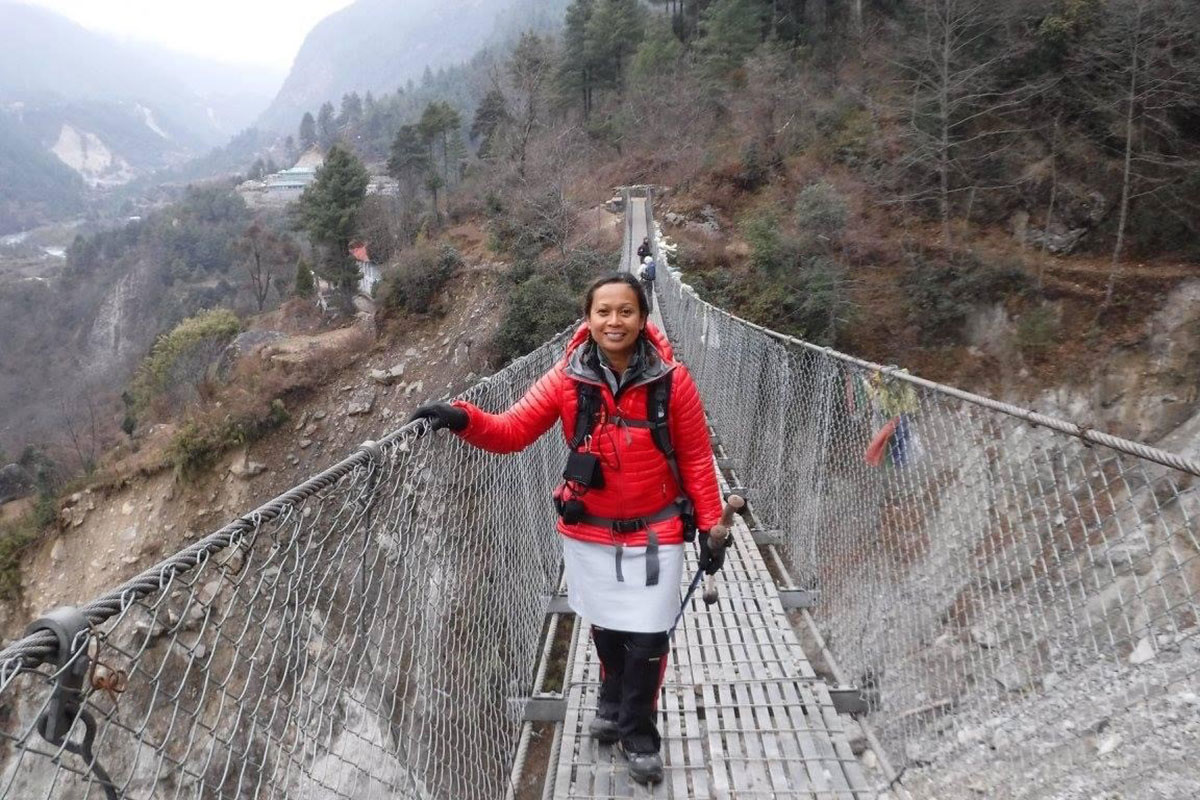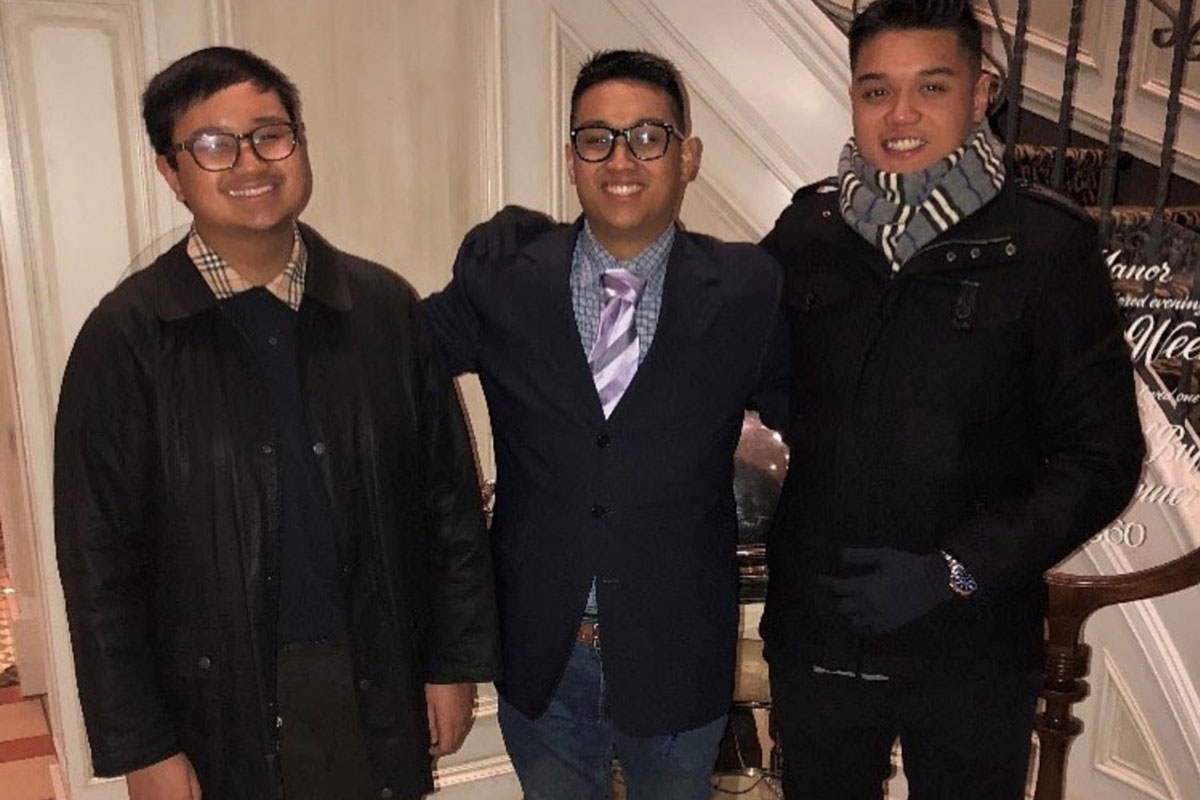
Elaine Mosqueda has traveled far in so many ways since moving from the Philippines to the United States at the age of 21.
“It has been a wonderful journey for the past 29 years,” says Ms. Mosqueda, Clinical Nurse II in Memorial Sloan Kettering’s Molecular Imaging and Therapy Service.
“MSK has played a vital role in who I am now,” she says. “Working with cancer patients has taught me to be strong, to be courageous and resilient, and to value life more each day.”
A Childhood by the Sea
Ms. Mosqueda was born in Mangagoy, a village on the island of Mindanao in the Philippines. She and her six siblings spent countless hours exploring the beach, gathering seashells, discovering sea creatures, swimming in the surf, digging in the sand and making sandcastles, and boating in their family canoe.
They also spent a lot of time reading — their father placed a high value on literature. “He wanted us to excel at everything,” Ms. Mosqueda remembers. “He taught me to be a very disciplined person.”
Ms. Mosqueda and her two older sisters attended boarding school where she did, indeed, excel in academics and extracurricular activities, including public speaking, choir, the spelling bee, drama club, and the school newspaper. She was also a platoon leader in her school’s Citizen Army Training, military training that was part of the country’s high school curriculum at the time.
The American Dream
Ms. Mosqueda imagined having a career as a doctor, ideally an ear, nose, and throat doctor or an eye doctor. “I had poor eyesight, so it was my dream to help people with poor vision,” she says. With that in mind, she majored in biology in college.
But an aunt visiting from California, where she worked as a nurse, caused her to rethink her career plans. “She encouraged me to become a nurse as a stepping-stone to America,” she says. “She told me of all the opportunities for nurses in the United States. I realized that having a college degree was a way out of poverty and coming to America became my dream.”
Ms. Mosqueda switched her major to nursing during her sophomore year.
At 21, she and many other nurses from the Philippines were recruited by Saint Raphael Hospital in New Haven, Connecticut, which is now part of Yale New Haven Hospital. Though venturing to another continent seemed like a scary experience, Ms. Mosqueda was excited by this new opportunity and eager for the next chapter of her life to begin.
The History of Filipino Nurses in America
Filipino immigrants represented 28% of all immigrants working as registered nurses in 2018, according to the Migration Policy Institute. This is the result of the long history between the Philippines and the United States, which has included the migration of thousands of Filipino nurses to the US over a period of more than 70 years.
The Philippines became the first US colony following the Spanish-American War in 1898. After the war, the US established several nursing schools in the country with an American nursing curriculum.
Two years after the Philippines gained its independence in 1946, the US created the Exchange Visitor Program, an international educational exchange program that allowed professional workers from different countries to come to the US to work and learn about American culture. Many Filipino nurses, who were already trained in the American style of nursing, came to the US at that time.
These mass movements of Filipino nurses helped address US nursing shortages following World War II and inspired future generations of Filipino-American nurses and healthcare workers. Since the 1960s, more than 150,000 Filipino nurses have migrated to the US.
“I am proud to see more Filipino nurses in the medical world,” says Ms. Mosqueda. “We are natural givers and nurturers, and we like to be completely hands-on while working alongside our colleagues.”
Finding MSK
Ms. Mosqueda got married and moved to New York City, joining MSK’s Head and Neck Inpatient Service in 1992 at age 27 as a nurse on the Head and Neck Inpatient Service. She helped care for patients undergoing extensive oral, facial, or neck surgeries. After 14 years, she transferred to nuclear medicine in the Department of Radiology, where she assisted patients receiving diagnostic tests, such as PET scans, cardiac stress tests, bone scans, and more, by injecting radioactive isotope agents into their bloodstreams.
“Understandably, these patients had high levels of anxiety,” says Ms. Mosqueda. “My role was to allay their fears and support them as they went through their imaging and the uncertainties of their life-changing diagnosis.”
In January 2018, she transferred to the Molecular Imaging and Therapy Service in the Department in Radiology, where she currently oversees patients undergoing radioactive therapy. She also works with patients participating in radionuclide research studies.
Coping During the Pandemic

Like hundreds of nurses at MSK, Ms. Mosqueda worked on-site during the height of the COVID-19 pandemic. “Sad, uncertain times for patients, their families, my own family, and everyone around me,” she remembers.
The routine of working helped her cope with her own fears. As a long-time athlete, Ms. Mosqueda also found strength in her favorite activities, such as running, biking, kayaking, and hiking with her border collie, Picasso, at her lake cottage in New Hampshire.
In addition to climbing all 48 of the 4,000-foot peaks in New Hampshire, she has hiked to the Mount Everest base camp in Nepal and along the Inca Trail in Peru. She has run the New York City Marathon, and been a member of MSK’s competitive Dragon Boat team.
Feeling connected to the larger community during the pandemic has also been important. She finds meaning in volunteering with New York Cares at a food pantry in Kew Gardens, Queens.
Passing on a Legacy of Service

Following in her footsteps, two of Ms. Mosqueda’s three sons are pursuing nursing degrees. (Her third son graduated from the New Jersey Institute of Technology in 2019 with a degree in computer science in engineering technology.)
One son has volunteered with New York Cares, providing meals to elderly and indigent residents of Manhattan, and another has raised money for the animal shelter where she adopted her dog.
“Giving back to society makes me feel accomplished,” says Ms. Mosqueda. “And it’s a feeling I want my sons to know. Contributing to the greater good is part of their heritage.”



